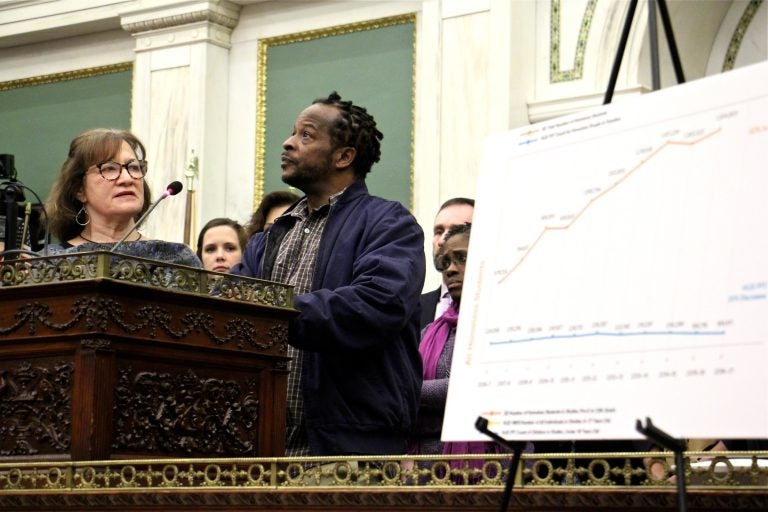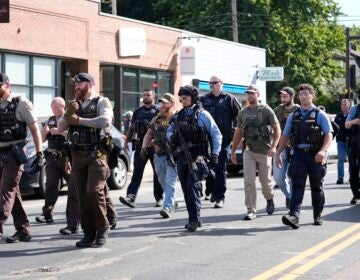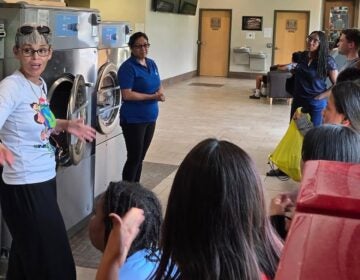As Philly tallies homeless population, advocates say families are overlooked
Advocates for Philadelphia’s homeless are demanding more funding for family shelters and prevention.

Bruce Thomas talks about the years that he and his family were homeless during a press conference at City Hall. According to data presented by Council members Helen Gym and Allan Domb and members of the Family Service Provider Network, homeless families in Philadelphia are undercounted and underserved. (Emma Lee/WHYY)
A coalition of more than a dozen advocacy groups for the homeless in Philadelphia is demanding the city keep better track of the families and children experiencing homelessness or in unstable housing.
Their pleas come as hundreds of people survey Philadelphia’s streets, looking for anyone sleeping in places unsuitable for human habitation, as mandated by the U.S. Department of Housing and Urban Development.
The annual canvassing began Wednesday night to supply HUD with the data to evaluate progress in tackling homelessness. The findings also influence the resources directed at the issue.
But the numbers don’t take into account all the families who are living outside shelters and off the streets in other unstable housing arrangements, advocates say.
“A couch is not a bed,” said Jason Miller, CEO of Families Forward Philadelphia, a group that helps provide families with emergency shelter.
“It is vital to shine light on the hidden nature of family homelessness since the point-in-time count findings are being used to define and shape our city’s response,” Miller said.
Advocates and Council members including Bill Greenlee, Helen Gym and Allan Domb are calling for the city’s Office of Homeless Services to partner with the school district to collect and share data on students experiencing homelessness.
They’re also asking that the city track the number of people seeking aid at homeless shelters who are turned away.
Finally, they want City Council and Mayor Jim Kenney’s administration to fund shelters to meet the needs of homeless families, fund more homeless prevention programs and prioritize the creation of affordable housing.
According to point-in-time counts in the city, the number of households with one adult and at least one child experiencing homelessness has slowly declined over recent years.
While the city reports having served more than 2,700 children, advocates say, the Philadelphia School District reported more than 7,200 of its students lacked regular nighttime housing.
For Bruce Thomas, the oversight is personal. He said he and his family experienced unstable housing for 10 years, and while he didn’t meet the official definition of being homeless, he felt like it.
After a work-related injury, Thomas, his wife and four children stayed with different family members so they wouldn’t be sent to separate homeless shelters.
“It’s the people that you don’t see, that need the help also,” Thomas said. “Like they didn’t see me, they didn’t know about me and my family for 10 years.”
Part of the problem is how HUD defines homelessness, according to advocates and City Council members. But the city can do some things to shed light on the scope of families at risk of losing their housing, they say.
“It probably falls on the city even more so because, clearly, the federal government is not doing what we feel is needed in a number of ways to help the most vulnerable people, so it’s on us to do what we can,” said Councilman Greenlee.
Greenlee said, while he can’t get into specifics of how much funding could be allocated to meet the needs of these families, it will be a priority this budget cycle.
Liz Hersh, director of the city’s Office of Homeless Services, said a national conversation about homelessness is long overdue.
“We applaud our local homeless providers and advocates for raising the issue and trying to jump-start a conversation about family homelessness that is a national crisis,” she said.
Locally, she said, the city has released a five-year strategic plan where a top priority is to increase resources to the most vulnerable people.
WHYY is your source for fact-based, in-depth journalism and information. As a nonprofit organization, we rely on financial support from readers like you. Please give today.




